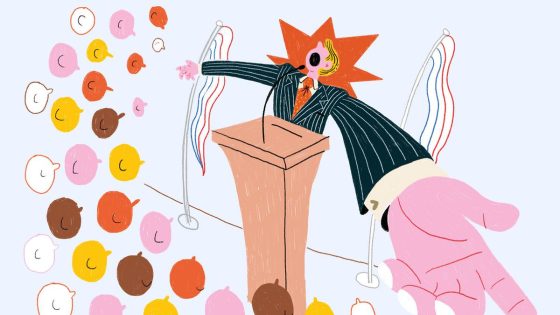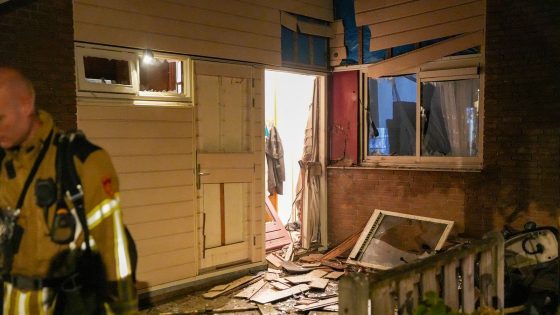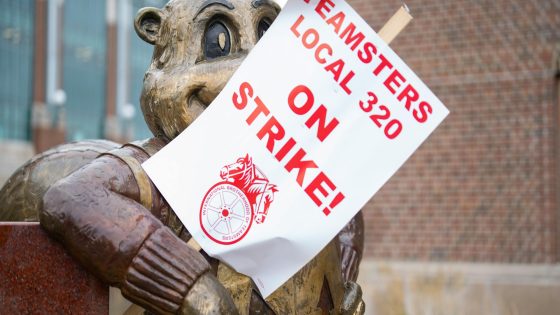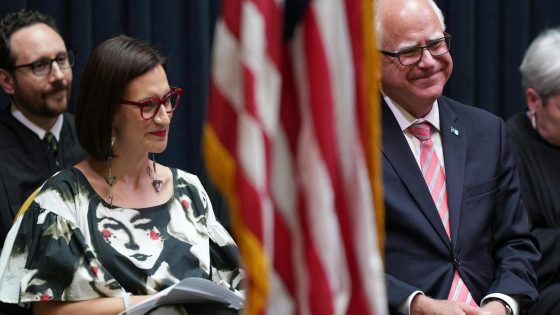Four out of ten Dutch people believe that the interests of those born in the Netherlands should weigh more than those of others. Nearly 80 percent of those who agree are conservative, while almost 75 percent of those who disagree are progressive. Seven out of ten people who previously voted for PVV, FVD, JA21, and BBB agree with this statement.
- Four in ten Dutch believe native interests should weigh more.
- Almost 80 percent of supporters are conservative.
- Nearly half of the population prefers strong leadership.
- More than half prioritize Dutch values in policy.
- Over a third believe an elite operates behind the scenes.
- The research was conducted by The Hague Centre for Strategic Studies.
This is evident from an analysis of data from a recent study by the think tank The Hague Centre for Strategic Studies (HCSS) regarding autocratic sentiment in the Dutch population. The extreme right violence on Saturday was directed against refugees and other migrants, indicating that those who commit violence with their own-people-first beliefs are not alone in the Netherlands.
According to HCSS researcher Gerben Bakker, “The ultranationalist groups find support and legitimacy among the silent middle class.” This support extends not only to the own-people-first idea but also to autocratic leadership. Almost half of the population believes that the Netherlands benefits more from a decisive leader than from a government that seeks compromises. Bakker considers this “a disappointingly large number.”
Nutritional Base
This support shows that there is a fertile ground for extreme right violence in the Netherlands, “with radicals who feel that the spirit of the times is on their side” and citizens “who quietly approve of radical action.” After extreme right riots in places like British Southport in 2024, Bakker and his colleagues have warned that such events could easily spill over into the Netherlands, where “the same ingredients” are present, such as the widespread dissemination of hate messages on social media.
The Netherlands is also grappling with a world increasingly gripped by antidemocratic forces. Countries in the gray area between democracy and autocracy, also known as “anocracies,” have a heightened chance of citizens committing violence. Bakker cites the united states, noting the Capitol riot by Trump supporters and the murder of Charlie Kirk.
The ultranationalist groups find support and legitimacy among the silent middle class.
“The ultranationalist groups find support and legitimacy among the silent middle class.”
— Gerben Bakker, Researcher
The Netherlands is not as polarized as the U.S., but there is significant division in society, as revealed by an analysis of responses from various demographic groups in the HCSS study. It hardly matters whether people are old or young, male or female, theoretically or practically educated, or have a migration background.
The only demographic characteristic that often makes a difference is whether one lives in a large city or a village. For instance, regarding the statement, “In this time we need more a decisive leader than a government that seeks compromises,” four out of ten city dwellers completely disagree, while this figure is less than three out of ten among village residents.
Fault Lines
The fault lines between demographic groups mainly arise from how people view society: progressive or conservative, internationally or nationally oriented, individualistic or collective, with a positive or negative outlook on the future. For example, regarding the statement, “The government should be able to intervene if judges make decisions that go against the will of the majority,” about half of those who completely disagree belong to internationally oriented Dutch citizens, while around one-tenth belong to their nationally oriented compatriots.
Progressive Dutch see climate change as the biggest international threat, while conservative compatriots rank it eleventh (with migration as their top concern). The division is also evident in the more than a thousand comments left by participants. One sees “dictatorial president Trump and his government + tech giants” as a threat to “our democracy,” while another describes the Netherlands as a “pseudo-democracy” where “the people have no say.”
This situation forms a cocktail of frustration over political decision-making, fear of geopolitical developments, conspiracy theories, and disdain for the ‘stupidity’ of their supporters, along with a deep aversion to migrants and concerns about that aversion. Bakker admits, “It’s not easy to say which element determines exactly what; it’s a sum of sentiments, really.”
In this richly filled bag, there are three compartments where many sentiments can be divided.
1. Politics Does Too Little (for US)
The political inability to solve problems is the most frequently mentioned reason for the desire for a strong leader. One participant describes it as: “Democracy is messy and slow and difficult, so it speaks less to the imagination.” Additionally, almost half of the population feels they have no say over what the government does.
Bakker finds this “an alarming number, really concerning,” as it shows that many people have dropped out, as earlier research by the Social and Cultural Planning Office has already indicated. This poses a significant problem for the support of one’s own democratic legal order. While this seems to provide fertile ground for autocratic sentiments, he also acknowledges, “The connection is not hard.”
2. Own People First
More than half of the population believes that Dutch values and culture should be central to policy. Over four out of ten respondents fully support the statement that the interests of those born in the Netherlands should weigh more than those of others.
Bakker finds this “alarming,” stating, “It shows that many people do not realize what the foundations of the liberal democratic legal state are.” He notes that this legal state is indeed “quite complicated,” and often clashes with what he describes as “ethnic distrust” among many Dutch citizens.
The research is indeed filled with xenophobia and racism. Comments vary in complaints about “too many foreigners” and the “loss of one’s own culture and safety and Christian norms and values.” Migration is identified as the primary threat to the Netherlands. “Then you see that people take the law into their own hands by forming their own clubs for border security,” says Bakker, “which goes against the principles of the legal state.”
3. An Elite Behind the Scenes
“The elite in the Netherlands,” someone mentions as the disruptive group that poses the greatest threat to the country: “that collaborates with globalist groups and ensures that citizens have less and less influence in favor of the elite, their power, and big capital.”
The elite has often been blamed in the comments, which are filled with references to the World Economic Forum and the World Health Organization. More than a third of the population endorses the statement that ‘an elite’ is active behind the scenes.
Bakker has studied research on, among others, the sovereigns, a group that wants to detach from the Dutch state. However, he “really did not see it coming that so many people believe in conspiracies.” He finds this very concerning, as people who are deep in the “rabbit hole” are “almost impossible to get out.”
Solutions?
The research on autocratic sentiment serves as a “warning,” says Bakker. His colleagues and he do not make recommendations: “That is not our expertise.” He suggests that education should focus more on the disastrous consequences of autocratic leadership. Additionally, he urges that the recommendations made by the State Commission on Democratic Renewal years ago to better involve the population in governance should finally be acted upon.
What the government should not do, according to Bakker, is label ‘antifa’ as terrorism, as was done last week by the House of Representatives. “That leads to the normalization of antidemocratic proposals and radical right politics.” This is dangerous, as the riots of the past weekend demonstrate. “In fact, we can consider ourselves lucky that it was such a small-scale uprising.”
Autocratic Sentiment and Political Preference
“The liberal democracy has become part of the political struggle,” observes Matthijs Rooduijn, a political scientist at UvA, as the preference for a decisive leader is dissected by political color. The dividing line follows the cultural conflict line in politics, which is also evident in immigration, European cooperation, or climate issues.
“When you ask people if they support liberal democracy, everyone says yes.” It is only when you ask about the characteristics of liberal democracy that you discover that support is much less robust. Rooduijn also sees this in other international research. He finds it concerning but not surprising that nearly 50 percent of the population sees merit in a strong leader.
Support for values such as checks and balances, the right to protest, or strong leadership also follows political lines. The parties that score high on autocratic sentiments are radical right or near that. Their voters desire a form of nationalism, yearning for ‘own people first.’ Supporters of populist parties also more frequently prefer a strong leader, believing that ‘the elite’ does not understand what ordinary voters find important.
Rooduijn concludes, “The populist premise that the will of the people should be directly translated into policy by political elites is difficult to reconcile with the core principles of liberal democracy.” People with these ideas often stand negatively towards checks and balances and debate.
It is notable that the Christian Union voter disapproves of autocratic leadership more than any other voter group. “In this respect, the support is more pronounced than on other points along the cultural conflict line,” observes Rooduijn. The CDA is positioned reasonably in the middle. “Under previous party leaders, the CDA pursued a more right-wing cultural course. Under Bontenbal, this is changing towards a more moderate position.” The group of CDA voters in the HCSS study conducted this summer is different from the potential CDA voters now. “The CDA base is also changing.”
The shift towards increasingly autocratic politics is not only happening abroad. In the Netherlands, there is also a political majority willing to go against democratic institutions on certain issues. “It is concerning that our government wanted to apply emergency law to migration and wants to criminalize illegality,” says Rooduijn. “These are measures that one must question whether they are not in conflict with the Constitution.”
About This Article
The research by HCSS on autocratic sentiment is based on a survey conducted together with KiesKompas. The report published in August is supplemented with data from the HCSS Public Monitor on Social Stability, published quarterly.
Nearly five thousand Dutch citizens, forming a representative sample, responded to more than 150 questions regarding national politics, international threats, and social resilience. They also answered questions about their worldview.
HCSS shared the complete dataset with, which combined the outcomes with demographic data and respondent profiles. HCSS researchers Jesse Kommandeur and Emma Bokel contributed to the analysis.
Originally reported by www.nrc.nl as “Er is in Nederland brede steun voor de ‘eigen volk eerst-gedachte’, en dat kan een voedingsbodem bieden voor extreemrechts geweld” on 2025-09-24 16:11:00.


























